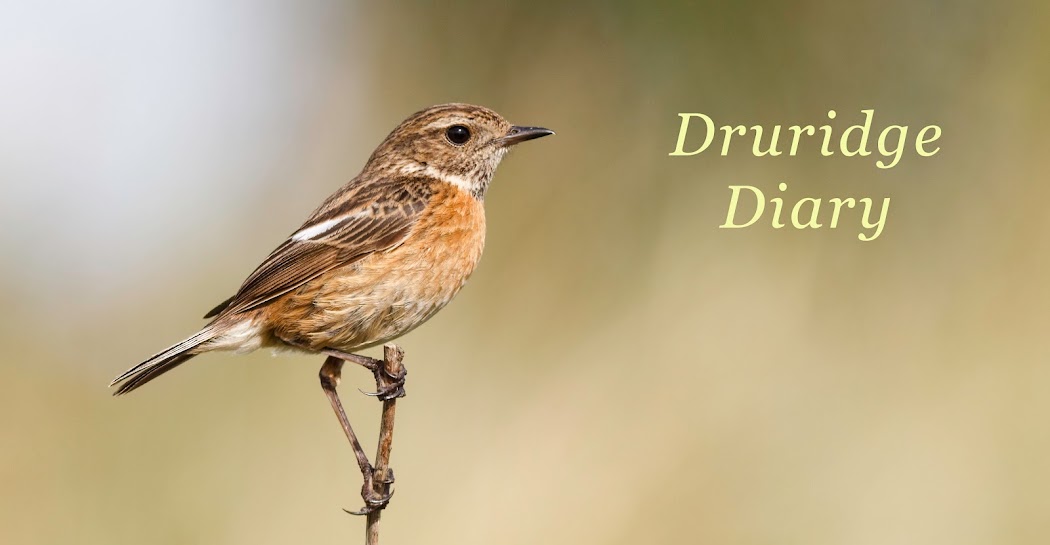With strong northerlies forecast overnight and early morning I suspected I might be seawatching today especially as I had the day off work. When I woke at 6am it was lashing it down with rain, I turned over and went back to sleep, If I'd had to go to work, I would've got up and gone anyway but I had the luxury of more time.
I eventually arrived at my dune watchpoint at 9am, it was too windy to stand on the dune ridge so I hunkered down in the dunes on a useful perch as I could be sometime.
The first bird I saw was a Bonxie, close in too. There wasn't a lot of action until pretty much the second notable bird I got onto was a skua, a bit further out than the Bonxie, quite distant. A grey bird against the sea with a more languid tern-like flight - Juvenile Long-tailed Skua! My fifth of the year incredibly.
It was steady after that, Manx Shearwaters coming through in little groups or singles and a few Sooty Shearwaters including a single group of six together about half-way out. There were a few distant Skuas that went unidentified - that's one of the problems with Druridge but a couple Arctic skuas were closer and one came into the bay to harass terns and a couple more Bonxies came through. A drake Velvet Scoter came in very close, north, on its own and a group of ten Pale-Bellied Brent were also really close.
By 9.45am I was regretting not getting up earlier, the sky brightened and the sun even threatened to come out and the sea went 'silvery' - not good, anything more than half way out was unidentifiable. I was temped to pack up but visibility improved a bit as a cloud came over so I hung on. I was pleased that I did as the bird of the day, and one of my best seawatching experiences at Druridge happened soon after.
A bird flew north, close-in and therefore low in my scope-view, so it passed through quickly, but it looked interesting and I tried tracking it through the troughs in the breakers, a shearwater, pale on the undersides but 'dumpy looking'. It was flying really slowly, moving back and forth, passing over and through the scoter flock, looking like it was feeding amongst them. It wasn't a Sooty, it had a pale belly anyway but the jizz was altogether wrong and it didn't have the contrast dark/white of a Manx and it just didn't look right.I was sure it was Balearic Shearwater. It landed among the Scoters briefly, before making a short flight and landing again, it did this three or four times, only landing for a few seconds before taking another short flight.These short flights gave good views when it wasn't in a trough and the dusky underwing, darker 'armpits' and dumpy appearance confirmed my initial ID. Eventually it moved off north, slowly again, feeding as it went. In hindsight I probably could have had a record shot of it, but I was too busy 'enjoying the bird'. This was my fifth Balearic at Druridge but by far the best views I've had of one here and my first since I saw two on 5th September 2013.
By 10:40, the light had really gone. I kept going until 11:05 to get the two-hours in and saw a few more birds including some Teal and a Golden Plover picked up on call just over the breakers, but it was high-tide.
It was interesting to compare my figures with headland watchpoints to the north and south of me. Obviously being in the middle of a bay I miss out on birds but I seem to miss out on some species more than others, Bonxies are a good example. I saw five in two hours today, Mark Eaton had 13 at Boulmer, Jack Bucknall had 13 (3 1/2 hours) at St. Mary's and Ben Steel had 19 in two and a half hours at Howick.
I think powerful birds like Bonxies and to some degree Poms (I didn't see one today) don't drift into the Bay, they just take a straight line from Snab Point to Coquet Island so are too distant for me. I do better for Arctics than some headlands because the terns feeding in the bay draw them in and largely comparable for Long-tailed Skuas which seem to hug the coast more, or even curt off headlands (I've seen them do this at Church Point). Likewise, I do okay for Manx (and today for Balearic) shearwaters but struggle with the bigger Shears, with only one Cory's (in 2005) and no Great Shears ever.
Despite the disadvantages of being in a bay, I'd swap a dozen of any of those species at Church Point for jut one on the patch. Above all, I love a good seawatch!
Highlights 09:05-11:05 (all N) (Full list here)
Pale-bellied Brent 12 (10N 2S)
Teal 56
Velvet Scoter 1 (drake)
Bonxie 5
Arctic Skua 4
Skua sp 6
Long-tailed Skua 1 (juv)
Golden Plover 1
Sooty Shearwater 11
Manx Shearwater 24+
Balearic Shearwater 1
Two photos taken as I was packing up.
 |
| Adult Lesser Black-backed Gull |
 |
| and juvenile |

No comments:
Post a Comment